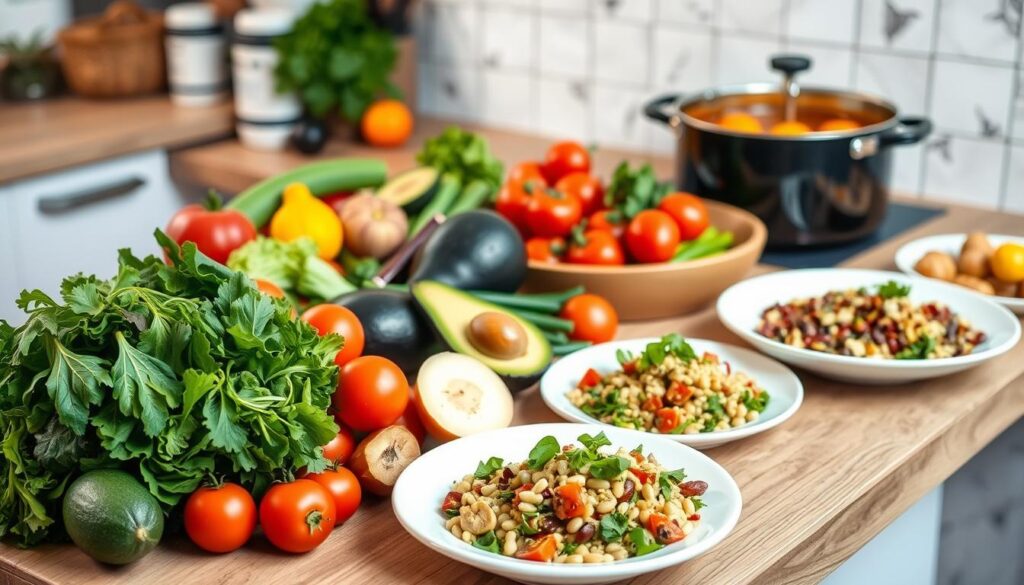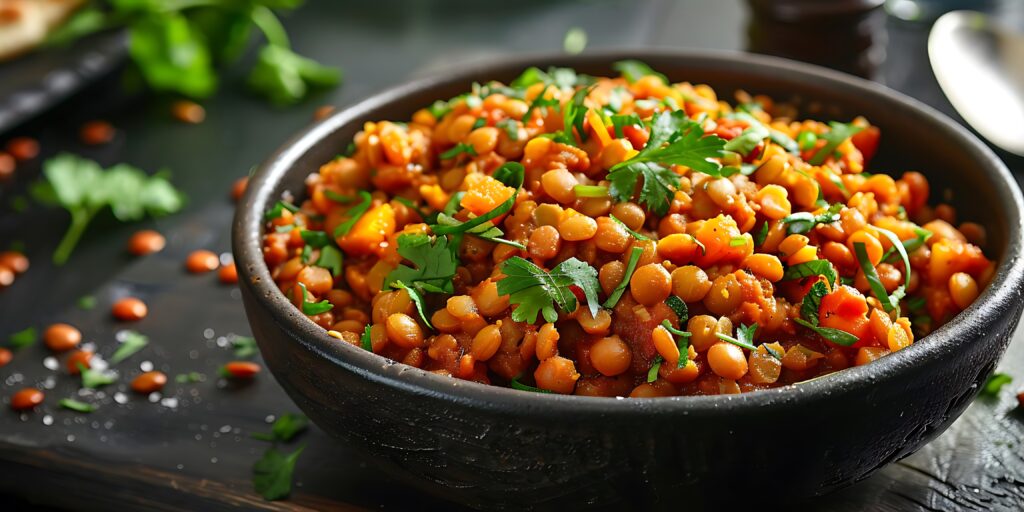As a vegan, getting all the nutrients your body needs is key to staying healthy. A good plant-based diet can cover most bases, but some nutrients are harder to find. That’s where supplements come in, helping to fill any gaps in your diet.
Studies show that plant-based diets are often richer in vitamins A, C, and E, and minerals like thiamin and magnesium. But, they might lack nutrients like omega-3 fatty acids, vitamin B12, and calcium. It’s important for vegans to watch their intake of these essential vitamins and minerals.
In this article, I’ll show you the top supplements every vegan should take. By knowing which nutrients are most important and how to get them, you can stay healthy on a plant-based diet. This way, you can enjoy the benefits of a vegan lifestyle without missing out on important nutrients.
The Importance of Proper Nutrition on a Vegan Diet
Starting a vegan lifestyle can be very healthy. But, it’s key to watch what you eat. A vegan diet should have lots of vitamins A, C, E, and minerals like thiamin and magnesium. Yet, it might miss out on omega-3 fatty acids, vitamin B12, and calcium.
Studies say 95% of vegans get their nutrients from plants and fortified foods. It’s vital to eat a variety of foods to stay healthy. This way, you can avoid missing out on important nutrients.
For vegans, getting enough calcium is easy with foods like green leafy veggies and tofu. Iron from plants is harder to get than from meat. So, eat lots of pulses, nuts, and dried fruits to get enough iron.
Finding vitamin B12 can be tough for vegans. But, they can get it from fortified cereals and nutritional yeast. Vegans can also get omega-3s from foods like chia seeds and walnuts.
To stay healthy, vegans should eat a balanced diet and take supplements if needed. Drinking 6 to 8 cups of water a day is also important. This helps avoid nutrient shortages and keeps you feeling great.
Vitamin B12: The Essential Nutrient for Vegans
As a vegan, I know how vital vitamin B12 is. It helps make red blood cells, supports the nervous system, and aids in DNA creation. Vegans can get B12 from fortified foods and supplements to avoid a deficiency.
The daily vitamin B12 needs vary. The US says adults need 2.4 micrograms, while nursing moms should get 2.8 micrograms. Germany suggests 3 micrograms. About 50% of B12 from food is absorbed by the body.
Vegans can find B12 in fortified foods like nutritional yeast and through supplements. I try to get at least 250 mcg daily or 1000 mcg twice a week. But, taking more than 5000 micrograms a week is not safe.
It’s key for vegans to keep B12 levels up. Not enough B12 can raise homocysteine levels. This is linked to brain decline, heart disease, early death, and weak bones. Blood tests for B12 might not work well for vegans, especially those eating algae or plant foods with B12-analogues.
To stay healthy, vegans should focus on getting enough B12. This can be done through fortified foods and supplements. As a vegan, I make sure to get the nutrients my body needs to stay healthy.
Vitamin D: Maintaining Strong Bones and Immune Function
As a vegan, getting enough vitamin D is key for strong bones and a healthy immune system. Vitamin D helps the body absorb calcium, which is crucial for dental and skeletal health. Without enough vitamin D, the immune system can weaken, and you might feel down.
Sunlight is a natural source of vitamin D, but many things can block its production. These include living far north, having darker skin, or spending lots of time indoors. A study found that 41.6 percent of Americans might not have enough vitamin D. African American and Hispanic people are at the highest risk.
But, there are vegan ways to get vitamin D. Fortified plant milks like soy, almond, and rice milk have 96 to 116 IU per serving. Fortified cereals and orange juice offer 8 to 100 IU per serving. Mushrooms grown in sunlight can have about 450 IU per 100 grams.
To get the most out of vitamin D, take supplements with a high-fat meal. A study showed that taking vitamin D-3 with a fatty meal raised blood levels by 32 percent after 12 hours. Adults should aim for 5,000 IU to 8,000 IU (125 mcg to 200 mcg) daily. But, always check your blood levels to find the right dose for you.
Omega-3 Fatty Acids: Supporting Brain and Heart Health
Omega-3 fatty acids, especially EPA and DHA, are key for brain and heart health. They help reduce inflammation. While plants like flaxseeds and walnuts have ALA, our bodies don’t easily turn it into EPA and DHA. Algae oil supplements are a good choice for vegans, offering EPA and DHA directly.
The National Institutes of Health suggest 250-500 mg of EPA and DHA daily. Ritual Omega-3, for instance, has a 2:1 DHA to EPA ratio. It gives 308mg of DHA and 154mg of EPA per capsule. DHA is vital for brain function.
Algal oil comes from microalgae and is a green option for vegans. It’s not made by fish. When picking an algae oil supplement, make sure it’s tested for purity and safety.
Eating foods rich in omega-3s can be very beneficial. Omega-3s can lower asthma risk in kids from indoor pollutants. Eating oily fish like salmon twice a week is good for omega-3 intake. But, too much from supplements might not be as good as food.
Iron: Preventing Anemia and Maintaining Energy Levels
As a vegan, getting enough iron is key to avoid anemia and keep energy up. Iron helps make hemoglobin, which carries oxygen. Vegans need more iron because plant-based sources are less easily absorbed.
There are many tasty iron-rich foods. I love lentils, tofu, spinach, and kidney beans. Blackstrap molasses is also great, with 7.2 mg of iron in just 2 tablespoons.
Plant-based iron isn’t as easily absorbed as animal-based iron. To help, I eat foods high in vitamin C with my iron-rich meals. This boosts iron absorption from plant-based foods.
Vegans need about 32 mg of iron daily, while men need 14 mg. If you think you might be low on iron, see a doctor. They can test and advise on supplements. By focusing on iron and eating a variety of iron-rich plants, I stay healthy and full of energy on a vegan diet.
Calcium and Zinc: Building Strong Bones and Boosting Immunity
As a vegan, getting enough calcium and zinc is key. Calcium helps build strong bones and teeth. You need 1,000 mg daily. Leafy greens, fortified milks, and tofu are good sources.
Most people get 500-600 mg from food. You might need 500 to 1,000 mg more from supplements.
Zinc is important for your immune system and healing. You can find zinc in whole grains, legumes, nuts, and seeds. But, phytates in these foods can lower zinc absorption.
Soaking, sprouting, or fermenting these foods can help. If diet alone isn’t enough, consider a zinc supplement. Look for one with 9.27 mg of zinc monomethionine.
To keep bones strong, look for a supplement with calcium, vitamin D3, and vitamin K2. This combo can lower fracture risk by 25% in women after menopause. Also, magnesium bisglycinate and boron help with calcium absorption and bone health.
For joint health, try glucosamine hydrochloride and Phytodroitin™. They offer benefits without animal products. Glucosamine comes from fungus, making it a sustainable choice for vegans. Focus on calcium and zinc to support strong bones and a healthy immune system.
Vegan Supplements: Choosing High-Quality and Reliable Products
Starting a vegan lifestyle means making sure your body gets all the nutrients it needs. A balanced vegan diet can cover most bases, but some vitamins and minerals are harder to get from plants. That’s where top-notch vegan supplements come in.
For the best vegan supplements, look for ones that have been tested by third parties. This ensures they are pure and effective. Brands like Deva, Garden of Life, and Pure Encapsulations offer great options. Make sure the label says “vegan” and check the ingredients to avoid animal products like gelatin or lanolin.
When picking a vegan B12 supplement, choose one with at least 1000 micrograms, taken two or three times a week. For vitamin D, algae-based D3 supplements are a good choice. They’re good for the planet and your wallet. Calcium supplements can help meet your daily needs, and vegan protein powders and omega-3s from algae oil can fill any gaps. Talking to a healthcare pro or dietitian can help you find the right supplements for you. They’ll make sure you’re picking brands that are both reliable and high-quality.






